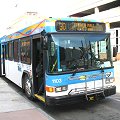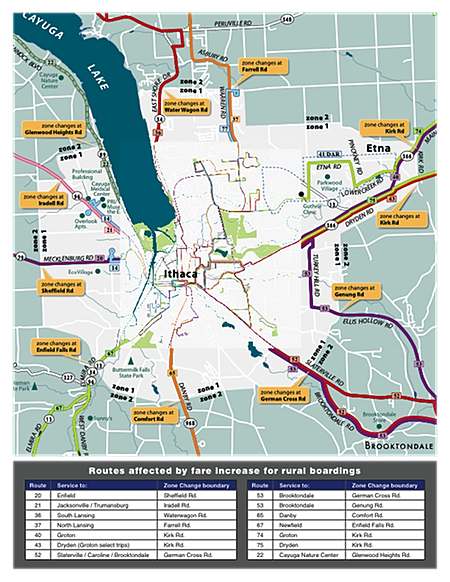- By Patty Poist
- News
 Print
Print  TCAT is implementing a two‑zone fare structure with rural fare increases as well as service changes, effective January 15.
TCAT is implementing a two‑zone fare structure with rural fare increases as well as service changes, effective January 15.Reacting to a dismal budget climate, the TCAT Board of Directors on Dec. 1 approved a nearly $12.8 million spending plan for 2012 that included the two‑zone fare system along with service reductions.
Price is based solely on location of boarding, not the distance traveled. Single‑ride fares that originate in rural areas (Zone 2) will increase from $1.50 to $2.50, whether traveling in Zone 1 or Zone 2. The fare for a trip that originates in Zone 1 will remain at $1.50, whether traveling in either zone. Rural trips at $2.50 inbound and $1.50 outbound will result in $4 round trips, up from the current $3.
Ride‑based and day‑based passes for Zone 2 have been discounted proportionally. The more per‑day, per‑ride passes TCAT passengers buy, the more they save, as historically been the case with TCAT’s fare structure. As an example, a yearly Zone 2 pass amounts to only $1.65 per day as opposed to a one‑time $4 day pass – a substantial savings. Please note: Zone 2 Tcard passes will be visibly distinguished from Zone 1 passes by green neon stickers.
Any ride‑based or day‑based passes purchased before the Jan. 15 changeover will remain valid in both zones until passes are depleted or expired.
As a new amenity to passengers, a new 72‑page TCAT Schedules & Service Guide will be distributed at shelters and bus stops, which includes 32 bus routes, a system map and comprehensive service information. The guide replaces the more costly single route schedules, however single schedules are available by request and are available on printable pdf format on TCAT’s website: www.tcatbus.com.
Though TCAT was forced to eliminate service into Tioga County and make other reductions, system changes include some improvements to better meet demand on heavily used routes and to provide more service to key locations.
“Some of these changes, particularly the service reductions, reflect TCAT’s need to balance its budget,” said TCAT Service Development Manager Doug Swarts. “Fortunately, we also were able to make some cost‑neutral improvements, many of which were suggested by our passengers and bus operators.”

Starting in summer of 2011, TCAT undertook the process of determining how to cut costs, reduce operating expenses and increase revenues in order to absorb anticipated budget cuts. Last year was the third successive year in which state aid, TCAT’s largest source of financial support, has been significantly reduced. Every indication is that there will be additional cuts in state as well as federal assistance in 2012. TCAT’s three local funders, Tompkins County, the City of Ithaca and Cornell University are facing their own fiscal challenges.
TCAT staff, along with the TCAT Board of Directors, went through a comprehensive the process of finding ways to reduce service on unfunded, poor performing and duplicative routes in a way that will have the least detrimental effect on TCAT passengers.
This is the first time since 2003 that TCAT has been forced to increase fares. Board members decided to raise rural fares this year because rural service is more expensive to operate. (It is important to note that in 2006 rural round trips were reduced from $6 to current levels so rural riders are still paying less at the fare box than they were six years ago.) Nonetheless, in anticipation of more budget cuts to come, it is important for TCAT passengers to begin preparing for another potential across‑the‑board fare increase in 2013 as well as the possibility of more service reductions.
The board’s approval of these measures came on the heels of 13 public information sessions and one public hearing with the board.
v8i2



